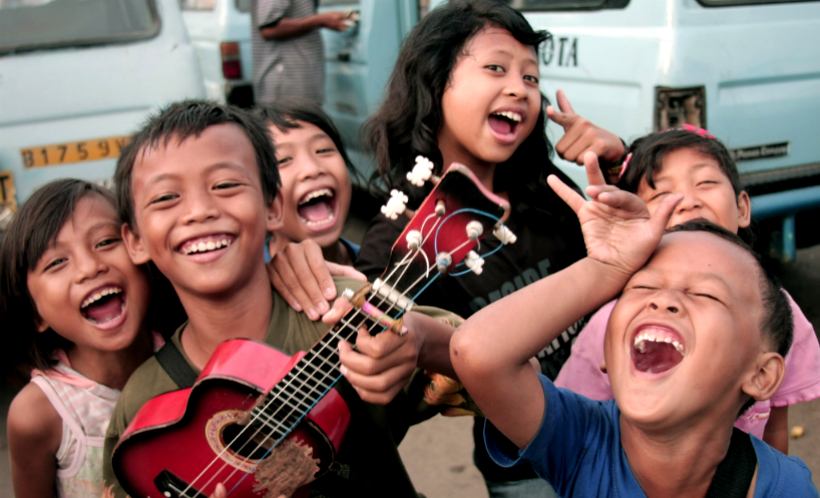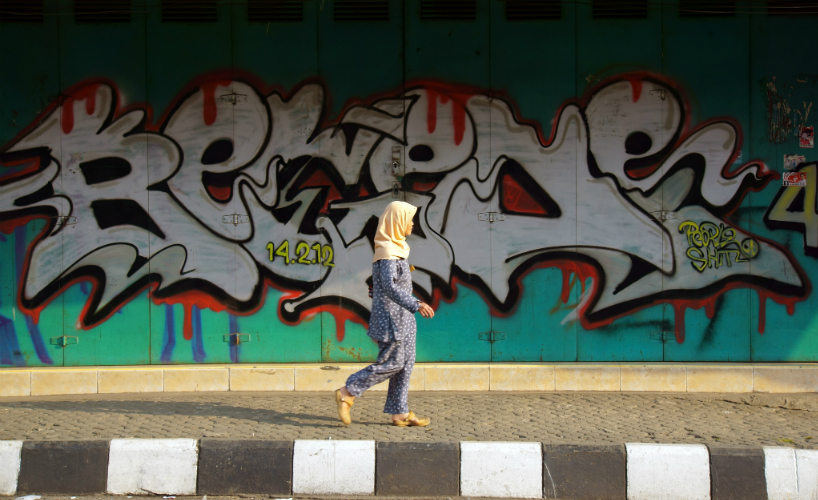The Indonesian government advocates” unity in diversity” and the Pancasila (Five Points) ideology that recognises religious freedom as “faith in one God”; however, tradition, custom, ethnic backgrounds and religion are sensitive issues. Within this context, it is best kept in mind that the vast majority of Indonesians are Muslims (ranging across a spectrum of liberal, moderate and conservative), and that contemporary Muslim society is trending toward conservatism.
To get along as well as possible with the locals, it should be noted that Indonesian society, with its more than 300 distinct cultural groupings is vastly pluralistic, with diversity the dominant trait. Overall, Indonesians are friendly and open, although sometimes reticent in encounters with foreigners mostly due to the concern they might not be able to communicate adequately due to language barriers, or that they might offend the visitor in some way. This is when the problematic general stereotype in the public mind that foreigners can be aggressive or rude may come into play.

Keep in mind that smiling comes easily to Indonesians; with cordiality, harmony, politeness, and patience held in high esteem, although the lack of social etiquette among motorists and motorcyclists on the street or among shoppers at cashier stations, or pedestrians at taxi stands or bus stops, who rarely queue and tend to push ahead in line, may seem to belie this.
For this reason, when misunderstandings do occur arising from cultural differences or situations, it is best to speak in moderate tones to locals, even in the midst of what could become heated exchanges. When in doubt, remember that politeness and a smile can defuse almost any uncomfortable situation.
For example, the perceived/or real lack of a foreigner’s ability to speak Indonesian may lead taxi drivers to refuse a fare and clerks in stores to ignore a shopper, or to call someone else (who can speak some English) to serve them. Patience and a friendly manner are helpful in these and other awkward interchanges.
What to wear
Dressing appropriately and for maximum comfort and protection from the tropical sun falls conveniently into line with the conservative religious (Islam) and customary climate of the archipelago that prevails even in contemporary metropolitan Jakarta.
In this context, it is advisable to dress as conservatively as you feel comfortable with personally; after all everyone has individual styles and preferences. The main points to take into consideration are to avoid wearing sleeveless tops, short-shorts, jean cut-offs, miniskirts, form-hugging leggings, skinny jeans or other tight pants and low-cut or revealing blouses in public places. There is no need to wear full covering to wrists and ankles and a headscarf unless visiting a mosque.
Hats and umbrellas (both as sunshade and to protect in downpours) are helpful. Jakartans often carry a small, easy to tuck away umbrella for use in the advent of both rain and for protection from the sun.

Although it is not necessary for women travellers to wear headscarves or full coverage unless visiting a mosque, in Jakarta, as in most parts of the archipelago, the best rule of thumb for both women and men visitors is to cover up the chest, thighs and armpits. Loose fitting over the knee shorts (Capri, Bermuda, or cargo pants) and T-shirts are acceptable “tourist garb” for both men and women.
For women travellers, skinny jeans are not appropriate (nor are leggings) unless they are worn with a top/blouse that comes down over the thighs to knee length. Shorts and cutoff jeans should be avoided and strapless sundresses of any length will draw unwanted attention. Dresses (knee length or longer) with cap sleeves and comfortably loose trousers are much more acceptable.
Language and religion
The Indonesian language, or Bahasa Indonesia, is the national language spoken throughout the archipelago. Outside of Jakarta, local languages and dialects are just as likely to be heard and used for primary communication – much more than the Indonesian language.
Even in Jakarta, which is a magnet to migrants, a number of commonly-used regional dialects or other languages can be heard; the most frequent are Betawi (indigenous Jakarta), Sundanese (West Java), Javanese (Central Java), Minangkabau (West Sumatra), Batak (North Sumatra), and Chinese.
In general, English is considered the “second language” in Indonesia, so if you speak English you should be able to navigate most interactions, especially in Jakarta and other tourism centres like Yogyakarta and Bali.
Although Indonesia is constitutionally a secular state; religion, as do tradition and local customs, plays a major role in daily life and sociopolitical, economic and other interactions across the archipelago. The officially recognised religions in Indonesia are Islam (87.18% of population in 2010), Protestantism (6.96%), Catholicism (2.91%), Hinduism (1.69%), Buddhism (0.72%), and Confucianism (0.05%).
